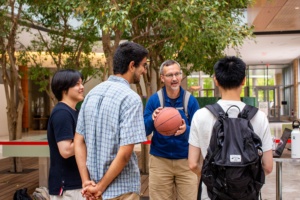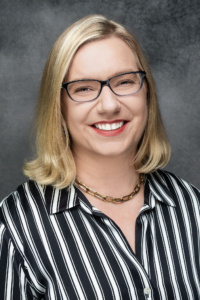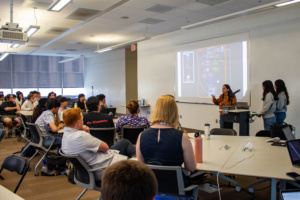As AI continues to reshape the global job market, universities are developing new programs to help students navigate the changing landscape. At the University of Wisconsin–Madison, the School of Computer, Data & Information Sciences (CDIS) launched forward-looking initiative, supported by OpenAI, designed to prepare students to lead in the AI era.
Enter the Summer of AI Laboratory (SAIL), a program that immersed undergraduates in real-world AI problem solving, industry mentorship, and project-based learning. With guidance from experienced mentors including UW alumni, SAIL is one of the ways CDIS is preparing students not just to adapt to the changing landscape of AI, but to shape it.
Remzi Arpaci-Dusseau, Director of CDIS and the driving force behind SAIL, created the program in response to shifting internship opportunities in the tech industry.
“As AI reshapes both industry and education, we knew we had to provide students with opportunities that went beyond the classroom,” says Arpaci-Dusseau. “SAIL gives them the chance to experiment, collaborate, and innovate with the same tools being used to transform entire industries.”
Over eight weeks, teams of students selected open-ended problem spaces, and built working AI prototypes. They had access to OpenAI’s models and tools, the same ones used in cutting-edge startups, and guidance from alumni mentors with deep technical and entrepreneurial experience.
The program was also led by David Ertl, Executive Director of the N+1 Institute.
“We would not have been able to pilot the program this summer without OpenAI’s support including scholarship funds, leveraging OpenAI’s tools, and executive support to enable the OpenAI team to collaborate with us. Together we formed an idea for the program and brought it to life,” says Ertl.
For Karan Kapur x’26, majoring in Computer Sciences and Data Science, SAIL offered a rare blend of independence, collaboration, and expert mentorship.
“I wanted to be part of SAIL because it offered exactly what I was looking for this summer: the freedom to build something original using AI, the mentorship to steer that creativity in the right direction, and the chance to work closely with a team of motivated students. Plus, getting access to OpenAI’s toolset was a huge bonus,” says Kapur.
Kapur and his team built a general-purpose Retrieval-Augmented Generation (RAG) system that companies can adapt and deploy using their own internal knowledge bases. Their goal was to create a flexible AI assistant that could be customized to serve accurate, conversational answers from any company’s documentation or internal data.
The Role of Mentorship
“Our mentor has been incredibly helpful in grounding our ideas in technical feasibility,” Kapur explains. “While we were focused on adding flashy features, they pushed us to focus on performance, latency, and user experience.”
Mentorship wasn’t just a feature of the program, it was one of its most valuable components. Utilizing the expansive CDIS alumni network connected students with professionals who not only understand the technical side of AI but also the broader industry landscape.
Computer Sciences student Maria Daniela Arias Camargo x’28, whose team created the AI-powered fashion assistant FindMyFit, also emphasized the impact of mentorship.
“Our mentors treated us like collaborators, not just students, which made me feel more confident in my ideas and more excited to keep improving the project. What stood out the most was how genuinely invested they were in our success,” says Camargo.
SAIL’s mentors included Ayush Kumar, Chris Harrison, Nida Tanveer, Tejvir Mann, Dan Petranek, Zach Meyers, and Sarah Buszka.

Buszka ’15, a UW–Madison alumna and founder of Forward AI Consulting, who worked closely with multiple teams throughout the program.
“The SAIL program is also an incredible opportunity for students and one that I wish I would’ve had in undergrad—perhaps I would’ve founded a company back then! Overall, I think it’s a great example of industry partnering with higher ed to push the frontier of knowledge in AI while giving students hands-on experience to apply their knowledge and to potentially discover new applications of AI,” says Buszka. “As professionals, I believe that we are responsible for stewarding the next generation towards success. I see it as an investment.”
According to Arpaci-Dusseau, mentorship is one of the most powerful ways CDIS’s alumni network continues to give back and push students forward.
“We’ve got alumni at places like OpenAI, Meta, Google, and more doing truly incredible work,” says Arpaci-Dusseau. “When they come back and mentor students, or help us build programs like SAIL, it creates this pipeline from Wisconsin to Silicon Valley. It’s one of our greatest strengths and a big part of what makes UW special.”
Working with OpenAI
The program culminated in a public showcase on August 8, where teams demonstrated their projects to mentors, peers, and members of the community. The top four teams were selected to present their work directly to OpenAI executives — including Srinivas Narayanan ’96, VP of Engineering, and Venkat Venkataramani ’02, VP of Applied Infrastructure, both of whom are Wisconsin CS alumni.

One of the chosen projects was FindMyFit, an AI-powered fashion assistant that helps people find clothing based on a photo or natural language request.
“It started with a simple idea: we’ve all seen an outfit online and thought, ‘Where can I get that?’ but ended up scrolling endlessly without success.” Alongside Riddhi Devarhubli x’27 and Zahabiyah Boty x’27, the team wanted to build something that “made this process easier and more intuitive, especially for users who might not know how to describe exactly what they want,” says Camargo.
The team used OpenAI’s CLIP and GPT to create FindMyFIT, resulting in a recommendation engine that feels more human and responsive than traditional keyword-based search tools.
“Presenting to OpenAI was a very exciting opportunity. Since we built our project using their tools, it felt meaningful to share how we applied them in a real, user-focused context. It’s something I’ll carry with me as I continue building projects and throughout everything I pursue in the future,” says Camargo.
The Impact of SAIL
Camargo was drawn to SAIL because it gave her the perfect space for experiential learning.
“SAIL gave us the chance to explore that through hands-on work with AI, and to build something that could actually help people in a practical, human-centered way.” says Camargo. “Programs like SAIL give students the space and support to go beyond the classroom. You are not just learning concepts, you are applying them to real problems, working with advanced tools, and learning how to collaborate in a meaningful way.”

Both Camargo and Kapur found SAIL to be a deeply valuable experience, one that not only enriched their academic growth but also equipped them with practical skills for their future careers in AI and beyond.
“I’m incredibly grateful to be part of SAIL’s first cohort. It’s rare to find a program that trusts students with cutting-edge tools, gives them creative freedom, and also backs that up with experienced mentorship. I’d recommend it to anyone who’s serious about learning how to build with AI,” says Kapur.
For CDIS, programs like SAIL are part of a larger vision: to better equip students for success in a world increasingly shaped by data, computing, and artificial intelligence. Through industry partnerships, mentorship, and immersive learning, CDIS is positioning UW–Madison as a national leader in AI education and workforce readiness.
“This is exactly the kind of future-focused, interdisciplinary, industry-connected experience we envision for our students,” says Arpaci-Dusseau. “It reflects our deep commitment to innovation, to student success, and to ensuring that Wisconsin continues to lead in computing and data sciences.”